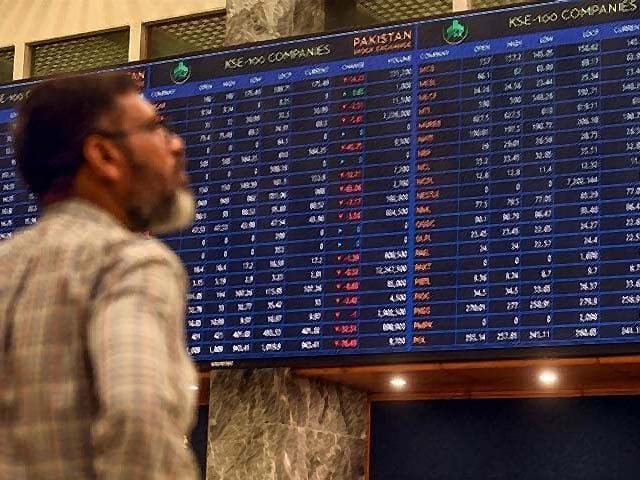Many stock brokers and investors have recently been praising the fact that the Pakistan stock market has been performing quite well. In fact, even during Prime Minister Imran Khan’s address on Independence Day the premier cited the rising stock market as a sign of Pakistan’s improving economic indicators. The reality, however, is that this is only partly true; but since so many eyes diligently watch the stock market screen, the movements invariably warrant attention.
Stock market movement is primarily a function of the expectations of a company’s profits, the macro-economic outlook, and the interest rates. Hence, in essence, one would expect that if a listed company’s business dynamics improve and profits increase, then naturally the company’s value would also rise. Similarly, if tax collection rises, more jobs are created, and the currency remains stable – ensuring that the economy strengthens – and that optimism will feed into the stock market. Lastly, if interest rates remain low, the stock market benefits since some businesses with huge loans pay lesser interest costs and thus profits increase, while low interest rates also enable listed companies’ owners to take on new projects and hopefully make profits on them; similarly, lesser returns on banks and national savings schemes cause investors to shift assets from the fixed (monthly/yearly) income towards the stock market in search of a higher return.
Therefore, before people jump into the stock market, it’s critical to know the reasons why the stock market has moved up in the first place. Firstly, it had fallen sharply by nearly 35% from January 2020 to March 2020. Secondly, the collapse was more profound, around 65% (in USD terms), from May 2017 to March 2020. Thus, the reversal was bound to happen because the valuations were very attractive for investments. Thirdly, the decline in the international oil prices from $60/barrel to $40/barrel drastically improves Pakistan’s import bills, currency stability, and inflation. Fourthly, falling inflation and the severe dent caused to the economy prompted Dr Reza Baqir to aggressively reverse course and cut interest rates by 6.25% to support businesses, jobs and the economy. Lastly, amnesty construction packages, tax collection, export growth and amicable settlement with the IPPs created a string of positive news in a short span of time. But what will the future hold for Pakistan’s stock market?
On a forward basis, the stock market still looks like an attractive asset to many for a variety of reasons. Companies’ profits haven’t reverted back to peak cycle valuations yet, consumption led growth is roaring in sectors benefiting from construction led activity, low interest rates are here to stay as per SBP’s guidance to support growth over inflationary risk, the improvement in taxes and exports could lead to sustainable debt reducing policies, and the SBP’s support for businesses in the form of loan deferments and restructuring eases the burden on shareholders.
However, investors jumping on the bandwagon now must understand that the quick rally is over. But, on a two-three year basis, if they have diversified portfolios of growth-oriented companies they will likely earn more profits than if their money was lying idle in a savings account or in a National Savings Scheme. It’s never advisable to stake your money in the market by taking excessive risks and investing in a few speculative stocks only. It’s absolutely vital to understand that this money is being deployed in a business, which is why financial accounts must be read, dynamics must be assessed, and financial disciplines must be followed against the temptation to attain quick money.
PTI’s approach and policy of export, industrialisation, agriculture and structural reform led ‘inclusive’ and ‘sustainable’ growth will determine the economic and stock market outlook. In other words, benefits should trickle down across the board from the rich to the poor, and any growth should be sustainable in the long term. Over the last decade, Pakistan has witnessed an unfortunate boom and bust economic cycle which has led us back to IMF’s surgery room. Pakistan’s over-reliance on remittances to make up for the decline in exports is undergoing subtle shifts as the Great Lockdown downgrades the outlook of GCC countries with high overseas employment.
In the short term, market expectations remain positive, and the markets move based primarily on investor sentiments about the outlook. In a rising cycle, investors look for positive news to justify upward market mobility, and in an end-cycle they dismiss good news clouded by impending macro-risks. Currently, the passage of the FATF bills improves the odds of white-listing, while fruitful discussions with IPPs may lead to a nominal tariff hike and the resumption of IMF loans, and the wide-spread availability of any Covid-19 vaccine would certainly re-energise the markets. The behaviour of investors oscillates between greed and fear; amid fear, stocks are sold and deemed worthless, while in a rising market greed kicks in.
Hence, in a nut-shell, when putting money into the stock market, investing in the long term should take precedence over short term trading. Buying shares in a company requires understanding of the company’s financial accounts, and one should try investing in companies that have relatively better corporate governance and share their profits with minority investors.



COMMENTS
Comments are moderated and generally will be posted if they are on-topic and not abusive.
For more information, please see our Comments FAQ